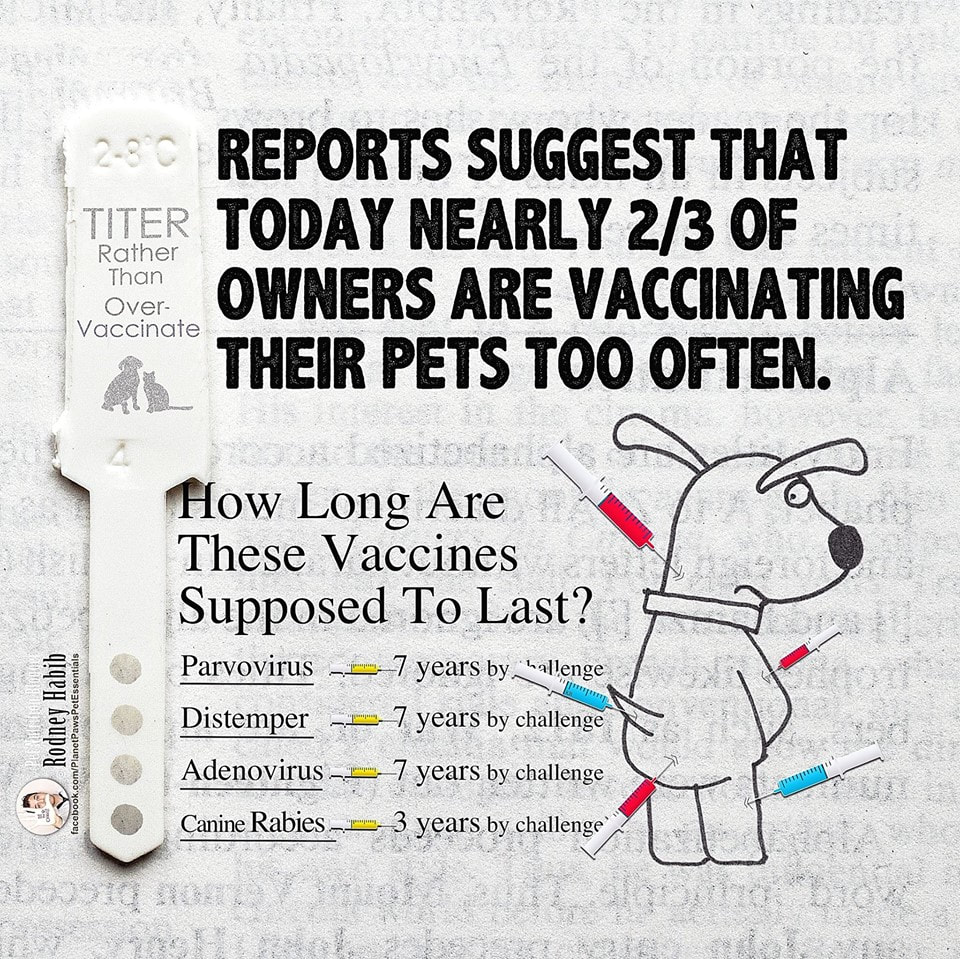What vaccines does your dog really
need?
What vaccines does your dog really need?
GOOD QUESTION
This is a question commonly asked by dog
lovers everywhere. Dog lovers want to do the right thing, protect their dog but
at the same time minimize risk of problems to their dog and avoid unnecessary
expenses.
Are Vaccines Safe?
Vaccines have a low rate of reactions but there are problems. Some of
the problems can be life-Because there are issues with vaccine safety, it is
ideal to give only what a dog really needs. I do not believe in OVER
vaccinating.
What
Vaccines do Dogs Really Need?
This is the answer. It depends upon the age and risk factors of a dog. I'll tell you
what I think and even tell you how I vaccinate my own dogs.
Puppies should receive a full series of vaccines beginning at 6 to 8 weeks of age and
repeated every 3 to 4 weeks until they are 16 to 20 weeks of age to protect
them against all the common diseases.
Unvaccinated adult dogs should
also receive two full sets of vaccines spaced 3 to 4 weeks apart.
Adult dogs should received vaccines as required by law (rabies)
and other vaccines at least every 3
years.
Vaccine Recommendations
Puppies –Puppies should receive immunity against some
diseases through their mothers milk but this disappears during the first few
months of their life. To protect puppies during this critical time, a
well-researched approach is taken: A series of vaccines is given every 3 to 4
weeks until the chance of contracting an infectious disease is very low. The
typical vaccine is a "combination" that protects against canine
distemper virus, canine adenovirus 2, parainfluenza, and canine parvovirus. FIVE IN ONE
SHOT
Many veterinarians also recommend incorporating
leptospirosis in the vaccination series (this combination is abbreviated
DHLPP). Rabies vaccines are given between 16 and 26 weeks of age in most states
(governed by law).
Dogs between 20 weeks and 2 years of age
It is typical to booster the puppy shots in young adult dogs to ensure adequate
lifelong immunity against deadly viral diseases. Your veterinarian will likely
"booster" your dog to protect against canine distemper virus, canine
adenovirus, parainfluenza, and canine parvovirus (the four viruses are commonly
abbreviated DHPP). Many veterinarians also recommend incorporating
leptospirosis in the vaccination series (the 5 components are abbreviated
DHLPP).
Many dogs are also immunized against bacterial infections
(e.g. bordetella and leptospirosis). The immunization for
these diseases typically do not persist for more than a year making yearly (and
occasionally more frequent) booster vaccines advisable.
The bordetella protects against "kennel cough" and is
often a requirement of boarding facilities. Bordetella is also recommended for
dogs that attend dog parks, conformation shows or agility
competitions.
There is currently a vaccination available for canine
influenza virus. The vaccine is recommended for dogs "at risk". Dogs that
frequently interact with other dogs, participate in activities with other dogs
or are boarded are considered at risk and can benefit from vaccination.
The rabies vaccines should be given as recommended by local law. Newer
vaccines effective against specific forms of the bacteria leptospirosis may be
important in some areas.
Adult dogs (over 2 years of age)
Annual
revaccination (boosters) is recommended for the first year after the "puppy
vaccines"; thereafter, you should discuss the benefits and risks of annual
vaccination with your vet.
In the past, the DHLP (distemper, hepatitis,
leptospirosis, parvovirus) vaccine was typically given each year. These
recommendations are changing. The American Animal Hospital Association (AAHA)
came out with new guidelines in 2006 that suggests that adult dog vaccines
boosters may be adequate if given every 3 years. Specific vaccine requirements
for individual dogs should be discussed with your veterinarian.
The most appropriate vaccination program for your pet should be
followed.
Again, if the risk of kennel
cough or canine influenza virus is great, a vaccine against bordetella and canine flu
is recommended. Both vaccines need to be given twice initially then each
year. You and your veterinarian should assess whether it is required.
The rabies vaccine should be given as recommended
by local law. Newer vaccines effective against specific forms of the
bacteria leptospirosis may be important in some areas. The
need for the vaccine should be determined based on the area of the country your
dog lives in and his or her life-style. If given, they should be administered
once to twice a year.
Other vaccinations that are sometimes given by
your veterinarian include coronavirus, Lyme and giardia.
These are not routinely given to every animal, and their use should be
discussed with your veterinarian. The American Animal Hospital Association
(AAHA) came out with new guidelines in 2006 that suggests that coronavirus and
giardia vaccines are not recommended for dogs at any age. The Borreliosis/Lyme
disease vaccine is recommended for dogs that live in an endemic area where risk
of exposure to the tick vector is high or dogs that travel to endemic
areas.
Another option to determine what vaccines your dog needs is to do
vaccine titers.
If your adult dog has an adverse reaction to the
vaccine (fever, vomiting, shaking, facial swelling or hives) discuss the risk
of annual revaccination with your
veterinarian.
Should You do Vaccine Titers?
A vaccine titer is a blood test that determines the presence of antibodies that
develop in response to the vaccine. Since varying amounts of antibodies can be
detected in different animals, titers are expressed in
terms of ratios. Adequate levels of vaccine titers indicate that the pet does
not need a booster vaccination at that time. Low titers indicate that
vaccination will be necessary to provide immune protection. This is a method to
determine if a dog needs vaccines.
Historically, the cost of
doing this test is far greater than giving the vaccine and therefore most
veterinarians and
pet owners did not do them. However, with the increased risk of vaccine
complications, this is a reasonable option.
lovers everywhere. Dog lovers want to do the right thing, protect their dog but
at the same time minimize risk of problems to their dog and avoid unnecessary
expenses.
Are Vaccines Safe?
Vaccines have a low rate of reactions but there are problems. Some of
the problems can be life-Because there are issues with vaccine safety, it is
ideal to give only what a dog really needs. I do not believe in OVER
vaccinating.
What
Vaccines do Dogs Really Need?
This is the answer. It depends upon the age and risk factors of a dog. I'll tell you
what I think and even tell you how I vaccinate my own dogs.
Puppies should receive a full series of vaccines beginning at 6 to 8 weeks of age and
repeated every 3 to 4 weeks until they are 16 to 20 weeks of age to protect
them against all the common diseases.
Unvaccinated adult dogs should
also receive two full sets of vaccines spaced 3 to 4 weeks apart.
Adult dogs should received vaccines as required by law (rabies)
and other vaccines at least every 3
years.
Vaccine Recommendations
Puppies –Puppies should receive immunity against some
diseases through their mothers milk but this disappears during the first few
months of their life. To protect puppies during this critical time, a
well-researched approach is taken: A series of vaccines is given every 3 to 4
weeks until the chance of contracting an infectious disease is very low. The
typical vaccine is a "combination" that protects against canine
distemper virus, canine adenovirus 2, parainfluenza, and canine parvovirus. FIVE IN ONE
SHOT
Many veterinarians also recommend incorporating
leptospirosis in the vaccination series (this combination is abbreviated
DHLPP). Rabies vaccines are given between 16 and 26 weeks of age in most states
(governed by law).
Dogs between 20 weeks and 2 years of age
It is typical to booster the puppy shots in young adult dogs to ensure adequate
lifelong immunity against deadly viral diseases. Your veterinarian will likely
"booster" your dog to protect against canine distemper virus, canine
adenovirus, parainfluenza, and canine parvovirus (the four viruses are commonly
abbreviated DHPP). Many veterinarians also recommend incorporating
leptospirosis in the vaccination series (the 5 components are abbreviated
DHLPP).
Many dogs are also immunized against bacterial infections
(e.g. bordetella and leptospirosis). The immunization for
these diseases typically do not persist for more than a year making yearly (and
occasionally more frequent) booster vaccines advisable.
The bordetella protects against "kennel cough" and is
often a requirement of boarding facilities. Bordetella is also recommended for
dogs that attend dog parks, conformation shows or agility
competitions.
There is currently a vaccination available for canine
influenza virus. The vaccine is recommended for dogs "at risk". Dogs that
frequently interact with other dogs, participate in activities with other dogs
or are boarded are considered at risk and can benefit from vaccination.
The rabies vaccines should be given as recommended by local law. Newer
vaccines effective against specific forms of the bacteria leptospirosis may be
important in some areas.
Adult dogs (over 2 years of age)
Annual
revaccination (boosters) is recommended for the first year after the "puppy
vaccines"; thereafter, you should discuss the benefits and risks of annual
vaccination with your vet.
In the past, the DHLP (distemper, hepatitis,
leptospirosis, parvovirus) vaccine was typically given each year. These
recommendations are changing. The American Animal Hospital Association (AAHA)
came out with new guidelines in 2006 that suggests that adult dog vaccines
boosters may be adequate if given every 3 years. Specific vaccine requirements
for individual dogs should be discussed with your veterinarian.
The most appropriate vaccination program for your pet should be
followed.
Again, if the risk of kennel
cough or canine influenza virus is great, a vaccine against bordetella and canine flu
is recommended. Both vaccines need to be given twice initially then each
year. You and your veterinarian should assess whether it is required.
The rabies vaccine should be given as recommended
by local law. Newer vaccines effective against specific forms of the
bacteria leptospirosis may be important in some areas. The
need for the vaccine should be determined based on the area of the country your
dog lives in and his or her life-style. If given, they should be administered
once to twice a year.
Other vaccinations that are sometimes given by
your veterinarian include coronavirus, Lyme and giardia.
These are not routinely given to every animal, and their use should be
discussed with your veterinarian. The American Animal Hospital Association
(AAHA) came out with new guidelines in 2006 that suggests that coronavirus and
giardia vaccines are not recommended for dogs at any age. The Borreliosis/Lyme
disease vaccine is recommended for dogs that live in an endemic area where risk
of exposure to the tick vector is high or dogs that travel to endemic
areas.
Another option to determine what vaccines your dog needs is to do
vaccine titers.
If your adult dog has an adverse reaction to the
vaccine (fever, vomiting, shaking, facial swelling or hives) discuss the risk
of annual revaccination with your
veterinarian.
Should You do Vaccine Titers?
A vaccine titer is a blood test that determines the presence of antibodies that
develop in response to the vaccine. Since varying amounts of antibodies can be
detected in different animals, titers are expressed in
terms of ratios. Adequate levels of vaccine titers indicate that the pet does
not need a booster vaccination at that time. Low titers indicate that
vaccination will be necessary to provide immune protection. This is a method to
determine if a dog needs vaccines.
Historically, the cost of
doing this test is far greater than giving the vaccine and therefore most
veterinarians and
pet owners did not do them. However, with the increased risk of vaccine
complications, this is a reasonable option.
SO JUST HOW LONG DO YOUR PET’S SHOTS LAST?
Definitely longer than a year!
According to the top pet immunologist (aka vaccine expert) in the world, Dr. Ronald Schultz, Ph.D. – “ Annual revaccination provides no benefit and may increase the risk for adverse reactions.”
What the heck are adverse reactions (or side effects)?
Well according to the other rock star pet immunologist Dr. Jean Dodds:
“Side effects from dog vaccinations can occur anywhere from instantly up to several weeks or months later. Vaccines can even cause susceptibility to chronic diseases that appear much later in a dog’s life (Dodd, 2001).
Severe and fatal adverse reactions include:
•Susceptibility to infections.
•Neurological disorders and encephalitis.
•Aberrant behavior, including unprovoked aggression.
•Vaccines are linked to seizures. Distemper, parvovirus, rabies and, presumably, other vaccines have been linked with poly neuropathy, a nerve disease that involves inflammation of several nerves. (Dodds,2001)”
SO HOW LONG EXACTLY DOES YOUR PET’S VACCINE LAST?
According to the recommendations of the American Animal Hospital Association (AAHA), (basically the dudes who set the standards for the vets): “Among healthy dogs, all commercially available [core] vaccines are expected to induce a sustained protective immune response lasting at least 5 yr. thereafter”
Here’s the breakdown of the core vaccines from Dr. Ronald Schultz:
Minimum Duration of Immunity for Canine Vaccines:
Distemper- 7 years by challenge
Parvovirus – 7 years by challenge
Adenovirus – 7 years by challenge
Canine rabies – 3 years by challenge
The moral of the story here, if you have no idea when your pet is due or has been vaccinated, then just run a titer test and this will confirm if you are due, rather than over-vaccinate your poor pet, setting the stage for future problems!
What’s a titer test?
A titer test (pronounced tight-errr) is a laboratory or in-house veterinary test measuring the existence and level of antibodies (necessary to fight off disease) in your pet’s blood. Basically, it’s a test that will tell you whether or not you actually need to vaccinate your pet.
It’s also super useful when making a decision about vaccinating a pet with an unknown vaccination history, or for determining if pets have received immunity from vaccination.
Vaccinating your pet is super important so don’t lose the overall message here: VACCINATE, JUST DON’T OVER-VACCINATE!
According to Dr. Dodds:
“Vaccines have achieved many important benefits for companion animals, and has saved more animals' lives than any other medical advance.”
Want more on titer testing? Check it out:
https://www.facebook.com/photo.php?fbid=10153271303942028&set=pb.509362027.-2207520000.1461100680.&type=3&theater
Rodney Habib
"An educated, informed and well-researched community of pet owners can only put more pressure on the pet food industry to be better! When pet owners know better, they will only do better!"
Definitely longer than a year!
According to the top pet immunologist (aka vaccine expert) in the world, Dr. Ronald Schultz, Ph.D. – “ Annual revaccination provides no benefit and may increase the risk for adverse reactions.”
What the heck are adverse reactions (or side effects)?
Well according to the other rock star pet immunologist Dr. Jean Dodds:
“Side effects from dog vaccinations can occur anywhere from instantly up to several weeks or months later. Vaccines can even cause susceptibility to chronic diseases that appear much later in a dog’s life (Dodd, 2001).
Severe and fatal adverse reactions include:
•Susceptibility to infections.
•Neurological disorders and encephalitis.
•Aberrant behavior, including unprovoked aggression.
•Vaccines are linked to seizures. Distemper, parvovirus, rabies and, presumably, other vaccines have been linked with poly neuropathy, a nerve disease that involves inflammation of several nerves. (Dodds,2001)”
SO HOW LONG EXACTLY DOES YOUR PET’S VACCINE LAST?
According to the recommendations of the American Animal Hospital Association (AAHA), (basically the dudes who set the standards for the vets): “Among healthy dogs, all commercially available [core] vaccines are expected to induce a sustained protective immune response lasting at least 5 yr. thereafter”
Here’s the breakdown of the core vaccines from Dr. Ronald Schultz:
Minimum Duration of Immunity for Canine Vaccines:
Distemper- 7 years by challenge
Parvovirus – 7 years by challenge
Adenovirus – 7 years by challenge
Canine rabies – 3 years by challenge
The moral of the story here, if you have no idea when your pet is due or has been vaccinated, then just run a titer test and this will confirm if you are due, rather than over-vaccinate your poor pet, setting the stage for future problems!
What’s a titer test?
A titer test (pronounced tight-errr) is a laboratory or in-house veterinary test measuring the existence and level of antibodies (necessary to fight off disease) in your pet’s blood. Basically, it’s a test that will tell you whether or not you actually need to vaccinate your pet.
It’s also super useful when making a decision about vaccinating a pet with an unknown vaccination history, or for determining if pets have received immunity from vaccination.
Vaccinating your pet is super important so don’t lose the overall message here: VACCINATE, JUST DON’T OVER-VACCINATE!
According to Dr. Dodds:
“Vaccines have achieved many important benefits for companion animals, and has saved more animals' lives than any other medical advance.”
Want more on titer testing? Check it out:
https://www.facebook.com/photo.php?fbid=10153271303942028&set=pb.509362027.-2207520000.1461100680.&type=3&theater
Rodney Habib
"An educated, informed and well-researched community of pet owners can only put more pressure on the pet food industry to be better! When pet owners know better, they will only do better!"
How I
Vaccinate My Dogs?
For puppies – I give them a full vaccine series as described
above and booster vaccines when they are one year of age. They are vaccinated
for rabies as required by law (yearly or every 3 years depending on the
state/county law). I do the minimum required by law.
For
unvaccinated adult dogs
– they receive two sets of vaccines 3 to
4 weeks apart including bordetella and the canine
flu vaccine. They are vaccinated for rabies as required by law depending on the
county/state law.
Adult
dogs that were full immunized as puppies or young
adults. Adult dogs receive vaccine booster every 3 years. They have yearly
examinations and after they age of 7 –they have yearly blood work as well (which
has nothing to do with vaccination – but is a way for me to evaluate their
overall health). They are vaccinated for rabies as required by law (yearly or
every 3 years depending on the state/county law). I do the minimum required by
law.
Senior dogs in good health (large breeds over
the age of 7 or small breeds over the age of 10) –
receive vaccine booster
every 3 years, yearly exams and yearly blood work. They are vaccinated for
rabies as required by law (yearly or every 3 years depending on the
state/county law). I do the minimum required by law.
Senior dogs with
illnesses and on medications-For my senior dogs that are in poor health or on medications – to be
honest – I don't vaccinate them except for Rabies (as required by law). They do
receive exams and blood work twice a year (at least or more if needed depending
on these health). I asked 5 other veterinarians with dogs – how they deal with
their own dogs and they do essentially the same as outlined here.
Vaccinate My Dogs?
For puppies – I give them a full vaccine series as described
above and booster vaccines when they are one year of age. They are vaccinated
for rabies as required by law (yearly or every 3 years depending on the
state/county law). I do the minimum required by law.
For
unvaccinated adult dogs
– they receive two sets of vaccines 3 to
4 weeks apart including bordetella and the canine
flu vaccine. They are vaccinated for rabies as required by law depending on the
county/state law.
Adult
dogs that were full immunized as puppies or young
adults. Adult dogs receive vaccine booster every 3 years. They have yearly
examinations and after they age of 7 –they have yearly blood work as well (which
has nothing to do with vaccination – but is a way for me to evaluate their
overall health). They are vaccinated for rabies as required by law (yearly or
every 3 years depending on the state/county law). I do the minimum required by
law.
Senior dogs in good health (large breeds over
the age of 7 or small breeds over the age of 10) –
receive vaccine booster
every 3 years, yearly exams and yearly blood work. They are vaccinated for
rabies as required by law (yearly or every 3 years depending on the
state/county law). I do the minimum required by law.
Senior dogs with
illnesses and on medications-For my senior dogs that are in poor health or on medications – to be
honest – I don't vaccinate them except for Rabies (as required by law). They do
receive exams and blood work twice a year (at least or more if needed depending
on these health). I asked 5 other veterinarians with dogs – how they deal with
their own dogs and they do essentially the same as outlined here.
Link at bottom . WHY DO VETS INSIST ON BOOSTERS AND MAKE YOU FEEL LIKE YOU DO NOT CARE???
http://www.thedogplace.org/VACCINES/Vaccinosis-1_bloomer&Thomason.asp






